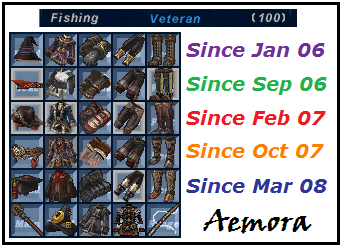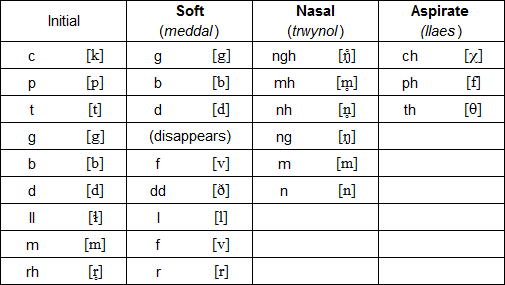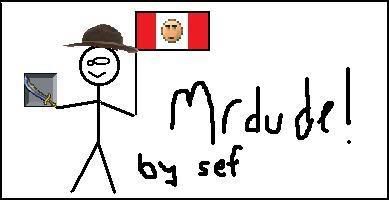I miss u guys!
-
Gilean
- Papi Chulo
- Posts: 389
- Joined: Sun Mar 25, 2007 2:15 pm
- Linkshell: Eden
- Location: Killer's Attic
I miss u guys!
OMG I want to play so bad it's been nearly 3 months w/o playing because I didn't have a connection in London. I was living in the campus now that I moved to the university, but finally got a house for me and my friends on the private sector, we want to get a wireless connection so probably by the end of the next week I will finally come back... damn miss u all... except that nigga who thinks is the black version of Leonidas.
- Scorsese
- Eden Alumni
- Posts: 4783
- Joined: Mon Mar 19, 2007 5:14 pm
- Linkshell: Eden
- Job Classes: BLM75 WHM75 BRD75 RDM75 SMN75 SCH75
- Location: The Twisting Nether
- Contact:
Re: I miss u guys!
Hell, I miss your fine ass too. :<
Hope to see u soon, Killer's been soooo emo w/o u. But I thought you were going back to Columbia in August? ?
?
Hope to see u soon, Killer's been soooo emo w/o u. But I thought you were going back to Columbia in August?

-
Safersephx
- Better than Kooyo
- Posts: 2768
- Joined: Mon Mar 19, 2007 6:03 pm
- Linkshell: PrettyPrincessClub
- Job Classes: Puppetmaster
- Location: waiting for you... at the end of time~
-
Lolmy
- Gender Illusionist
- Posts: 6215
- Joined: Tue Mar 20, 2007 2:27 am
- Linkshell: Eden
- Job Classes: 75BLM/75WAR/75SAM/75DRK/75RNG
- Location: Star gazing with dudes
Re: I miss u guys!
you rented a "private" house with a bunch of british dudes, wtf
I hate this linkshell with a fiery passion.

-
Gilean
- Papi Chulo
- Posts: 389
- Joined: Sun Mar 25, 2007 2:15 pm
- Linkshell: Eden
- Location: Killer's Attic
Re: I miss u guys!
Safersephx wrote: gil D;;;;;;;;;;;;
Oh man Safer how was your trip??? Sorry we couldn't set up a meeting but my parents came to visit me for like 3 weeks and they we like "fk the english weather let's go to spain"... and w/o internet was kinda hard.
Lolmy wrote: you rented a "private" house with a bunch of british dudes, wtf
I never said they were british... Actually there are 2 houses, 1 is for 8 and mine for 6, but I live with a bunch of French, a guy from Wales who speaks so weird.. I can't understand a shit lol Spanish girls and a korean girl that I've been hooking up with lol.
- Risbyn
- Back Sheep
- Posts: 953
- Joined: Tue Mar 20, 2007 1:29 am
- Linkshell: Eden
- Job Classes: 75DRK/75NIN/75SAM
Re: I miss u guys!
Hurry up and get back Gil, Killer has gone crazy, I tell you, CRAZY!!!!!! THE MADNESS!
"The internet is where men are gullible, women are men, and children are FBI agents."
"The day you get Apocalypse will be the day I quit." ~Scorsese
"The day you get Apocalypse will be the day I quit." ~Scorsese
-
Lolmy
- Gender Illusionist
- Posts: 6215
- Joined: Tue Mar 20, 2007 2:27 am
- Linkshell: Eden
- Job Classes: 75BLM/75WAR/75SAM/75DRK/75RNG
- Location: Star gazing with dudes
Re: I miss u guys!
a korean girl
oshi hooking up with udons sister
I hate this linkshell with a fiery passion.

-
Darkwarrior
- Crustache
- Posts: 1475
- Joined: Tue Mar 20, 2007 1:11 am
- Linkshell: Eden
- Job Classes: AWE/SUM
- Location: Canada
- Contact:
Re: I miss u guys!
i remember hooking up with a korean girl once... then getting punched in the face by my best friend for it (yeah... did i mention she was his sister? lol).
we laugh about it nowdays 8D ah good times, good times
we laugh about it nowdays 8D ah good times, good times
- Ploid
- Random Man
- Posts: 8958
- Joined: Tue Mar 20, 2007 5:22 am
- Linkshell: Eden
- Job Classes: THF/SAM/RDM/BST/WAR75
Re: I miss u guys!
Gilean wrote: He just need someone to do stupid shit with and he will be fine lol
Killer complimented me on my internet grammer.
Re: I miss u guys!
Gilean wrote: Spanish girls and a korean girl that I've been hooking up with lol.
Gil is a man whore!
-
Aemora
- Peaches 'n Cream
- Posts: 4164
- Joined: Mon Mar 19, 2007 11:44 pm
- Linkshell: Eden
- Job Classes: Blm75, Smn75, Cor75, Brd75, Sch75 womg
- Location: Alzadaal Undersea Ruins
Re: I miss u guys!
My girlfriend has an American chick called "Natalie" living with her, who likes to cook and talk.
A lot.
So fucking much.
Bitch won't shut up.
OMGGGGG~
And Welsh people don't speak weird, unless thedy themselves can speak Welsh, then you'll notice the accent creep through a looooooooooooooooooooooooooooooooooot into their English. I speak Welsh, but don't actually sound that Welsh 'cuz the Welsh accent makes you sound retarded.
A lot.
So fucking much.
Bitch won't shut up.
OMGGGGG~
And Welsh people don't speak weird, unless thedy themselves can speak Welsh, then you'll notice the accent creep through a looooooooooooooooooooooooooooooooooot into their English. I speak Welsh, but don't actually sound that Welsh 'cuz the Welsh accent makes you sound retarded.


- Risbyn
- Back Sheep
- Posts: 953
- Joined: Tue Mar 20, 2007 1:29 am
- Linkshell: Eden
- Job Classes: 75DRK/75NIN/75SAM
Re: I miss u guys!
Wait, Welsh is an actual language?! I thought it was all a joke...
I speak welsh! "BA-AA!"
I speak welsh! "BA-AA!"
"The internet is where men are gullible, women are men, and children are FBI agents."
"The day you get Apocalypse will be the day I quit." ~Scorsese
"The day you get Apocalypse will be the day I quit." ~Scorsese
-
Aemora
- Peaches 'n Cream
- Posts: 4164
- Joined: Mon Mar 19, 2007 11:44 pm
- Linkshell: Eden
- Job Classes: Blm75, Smn75, Cor75, Brd75, Sch75 womg
- Location: Alzadaal Undersea Ruins
Re: I miss u guys!
Welsh (Cymraeg)
Welsh is a Celtic language spoken as a community language in Wales (Cymru) by about 659,000 people, and in the Welsh colony (Y Wladfa) in Patagonia, Argentina (yr Ariannin) by several hundred people. There are also Welsh speakers in England (Lloegr), Scotland (yr Alban), Canada, the USA (yr Unol Daleithiau), Australia (Awstralia) and New Zealand (Seland Newydd). Welsh is fairly closely related to Cornish and Breton, and more distantly related to Irish Gaelic, Manx Gaelic and Scottish Gaelic.
At the beginning of the 20th century about half of the population of Wales spoke Welsh as an everyday language. Towards the end of the century, the proportion of Welsh speakers had fallen to about 20%. According to the 2001 census 23% of the population, 659,301 people, can speak the language and a total of 797,717 people, 28% of the population, claim to have some knowledge it.
According to a survey carried out by S4C, the Welsh language TV channel, the number of Welsh speakers in Wales is around 750,000, and about 1.5 million people can 'understand' Welsh. In addition there are an estimated 133,000 Welsh-speakers living in England, about 50,000 of them in the Greater London area.
The earliest known examples of Welsh literature are the poems of Taliesin, which feature Urien of Rheged, a 6th century king in what is now southern Scotland, and Aneirin's Y Gododdin, a description of a battle between Celts and Northumbrians which occurred in about 600 AD. Nobody knows for sure when these works were composed or when they were first written down. Before then, whenever then was, all writing in Wales was in Latin.
Today there are radio stations and a TV channel, that broadcast entirely or mainly in Welsh. There are also weekly and monthly newspapers and magazines. About 500 books in Welsh are published annually, and there is a thriving Welsh language music scene. There are a number of Welsh language theatre groups, and regular eisteddfodau or cultural festivals are held throughout Wales.
All school pupils in Wales study Welsh as a first or second language for 12 years, from the ages 5 to 16. The first school to use Welsh as the medium of instruction was set up in Aberystwyth in 1939. There are currently about 448 primary schools and 53 secondary schools in Wales that teach entirely or mainly throught the medium of Welsh. There is also a Welsh-medium school in London. Some courses at Welsh universities and colleges are taught through Welsh, and there are numerous Welsh courses for adults throughout Wales.
The Welsh alphabet (Yr Wyddor Gymraeg)
A a = "a" < Vowel
B b = "bi"
C c = "ec"
Ch ch = "éch"
D d = "di"
Dd dd = "édd"
E e = "e" < Vowel
F f = "éf"
Ff ff = "éff"
G g = "ég"
Ng ng = "éng"
H h = "aets"
I i = "i" < Vowel
L l = "él"
Ll ll = "éll"
M m = "em"
N n = "én"
O o = "o" < Vowel
P p = "pi"
Ph ph = "ffi/yff" (Depending on what part of Wales you come from)
R r = "ér"
Rh rh = "rhi"
S s = "és"
T t = "ti"
Th th = "éth"
U u = "u" < Vowel
W w = "w" < Vowel
Y y = "y" < Vowel
Notes (Nodion)
- - Where letters have two pronunciations, the first is used in North Wales and the second in South Wales.
- Long vowels are usually marked with a circumflex accent (to bach) though some are not.
- Short vowels are sometimes marked with a grave accent in places where they would normally be long.
- y = [ə] in monosyllables, non-final syllables and particles, [ɨ/̬ɪ] elsewhere, e.g. ynys ['ənɨ̬s / 'ənɪs]
- au = [a] or [e] when used as a plural ending, e.g. treigladau [trəi'glada / trəi'glade]
- si = [ʃ] when followed by a vowel, e.g. siarad ['ʃarad]
- j [ʤ] is sometimes used in words borrowed from English, such as garej and jeli
Mutations (Treigladau)
Welsh has a system of mutations which affects the initial letters of words. This feature is common to all Celtic languages and can make it difficult to find words in dictionaries. The nasal mutation (treiglad trwynol) and aspirate mutation (treiglad llaes) present few difficulties, but there are over 20 different occasions when soft mutation (treiglad meddal) occurs.

Man, I fucking hate Treigladau... :/
That's the basic of the Welsh language. It's harder than English, yo~
Edit: "Mutations" are used when the prior word is one of the following: am (for), ar (on), at (at <.<), gan (by), dros (over), drwy (through), heb (by), i (the), o (that), wrth (near), dan (under), hyd (long/length). There are a few others, exceptions like the "i before e except after c" rule. Treigladau will ALWAYS be the one that that will fuck you up in the Welsh language, because it changes the words so much, often changing their meaning completely.
Also, literal translations of Welsh into English won't always work, because a lot of the time, the meaning of the words are rearranged to make sense in the Welsh language, and when translated won't make sense in the English sense. Example: 'Mae gan Kevin siocled brown' = 'He has Kevin chocolate brown' is the literal translation, where as the correct translation would be "Kevin has brown chocolate"; the English to Welsh literal translation would sound both neanderthalic in its sense, and actually wouldn't make any sense in the first place.
Also, "Mae" doesn't only mean "he"... It's a contextual word, meaning that it fits and changes it's meaning to whatever context it's put in. It can mean 'he', 'she', 'it', 'the', 'they', 'I', 'them' ... All spin-offs of some form of person association.
Fucking language.
Last edited by Aemora on Thu Sep 20, 2007 2:47 pm, edited 1 time in total.


- Yorke
- Black Thumb
- Posts: 8891
- Joined: Tue Mar 20, 2007 3:39 am
- Linkshell: Eden
- Job Classes: THF WAR NIN
- Location: East Coast, United States
Re: I miss u guys!
u tawk funi
Tread softly because you tread on my dreams-

Lies are a funny thing,
they slip through your fingertips because
they never happened to you.

Lies are a funny thing,
they slip through your fingertips because
they never happened to you.
-
Safersephx
- Better than Kooyo
- Posts: 2768
- Joined: Mon Mar 19, 2007 6:03 pm
- Linkshell: PrettyPrincessClub
- Job Classes: Puppetmaster
- Location: waiting for you... at the end of time~
Re: I miss u guys!
;o my trip was good
london and paris were super fun... then i went to egypt, (alexandria / cairo / sharm el-sheikh) then the rest of the time was in kuwait with family.. (was good, but fkn 50 degree weather D; )
london and paris were super fun... then i went to egypt, (alexandria / cairo / sharm el-sheikh) then the rest of the time was in kuwait with family.. (was good, but fkn 50 degree weather D; )
 lol
lol
Re: I miss u guys!
Lolmy wrote: Speak American.
Yeah really, it's the only language I understand.
Re: I miss u guys!
You're retarded, Canadian isn't a language >o




